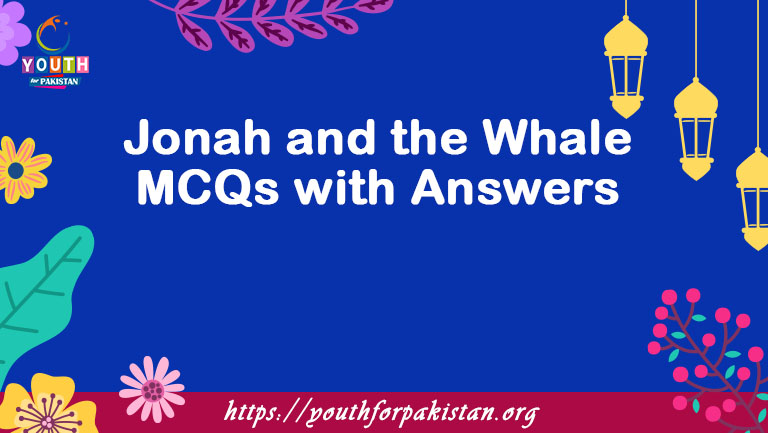The following are Jonah and the Whale MCQs with answers related to Islamic Studies. We have arranged the most important and repeated MCQs in all the competitive examinations. The students can clear their concepts for Jonah and the Whale MCQs online quiz by attempting these.
Jonah and the Whale Online MCQs with Answers
What is the name of the prophet featured in the story of Jonah and the Whale?
a) Moses
b) Jonah (Yunus)
c) David
d) Abraham
In Islamic tradition, what is the Quranic name for the prophet Jonah?
a) Yunus
b) Ibrahim
c) Musa
d) Isa
According to Islamic tradition, what is the primary message that the prophet Jonah was sent to deliver to his people?
a) The importance of prayer
b) The oneness of God (Tawhid)
c) The need for charity
d) The significance of fasting
In the story of Jonah and the Whale, what action did Jonah take when he faced difficulty and hardship at sea?
a) He prayed for help and guidance.
b) He abandoned his mission as a prophet.
c) He attempted to swim to safety.
d) He sought shelter in a cave.
What is the Quranic reference for the story of Jonah and the Whale?
a) Surah Al-Yunus (Jonah)
b) Surah Al-Tawbah (Repentance)
c) Surah Al-Baqarah (The Cow)
d) Surah Al-Maryam (Mary)
In Islamic tradition, what did the prophet Jonah do when he boarded a ship to escape his mission?
a) He slept peacefully.
b) He engaged in prayer.
c) He informed the crew about his mission.
d) He kept his identity a secret.
According to Islamic tradition, what caused the turbulent sea and storm when Jonah was aboard the ship?
a) The crew’s disbelief in God
b) Jonah’s disobedience to God’s command
c) The ship’s poor condition
d) A natural occurrence
In Islamic tradition, what did the crew of the ship decide to do when they faced the storm at sea?
a) They threw Jonah overboard.
b) They abandoned the ship.
c) They prayed for rescue.
d) They offered sacrifices to God.
According to Islamic tradition, what happened to Jonah after he was thrown overboard into the sea?
a) He drowned and died.
b) He was rescued by a passing ship.
c) He was swallowed by a giant fish.
d) He miraculously walked on water.
In the story of Jonah and the Whale, how long did Jonah remain inside the belly of the giant fish according to Islamic tradition?
a) Three days and three nights
b) One week
c) Forty days and nights
d) One month
According to Islamic tradition, what did Jonah do while inside the belly of the giant fish?
a) He slept peacefully.
b) He prayed and repented to God.
c) He tried to escape from the fish.
d) He explored the underwater world.
In Islamic tradition, what did the giant fish do after swallowing Jonah?
a) It spit him out onto the shore.
b) It carried him to the depths of the ocean.
c) It kept him in its stomach.
d) It released him in a distant land.
According to Islamic tradition, where did the giant fish release Jonah after he repented and sought God’s forgiveness?
a) On a deserted island
b) In the open sea
c) At the bottom of the ocean
d) Near the city of Nineveh
In Islamic tradition, what was the response of Jonah’s people when he returned to them after being saved from the giant fish?
a) They welcomed him with open arms.
b) They rejected him and his message.
c) They asked him to perform miracles.
d) They believed in him without hesitation.
According to Islamic tradition, what was the ultimate fate of Jonah’s people after they rejected his message?
a) They were forgiven by God.
b) They were destroyed by a divine punishment.
c) They embraced Jonah’s message.
d) They remained in a state of disbelief.
In Islamic tradition, what lesson is often drawn from the story of Jonah and the Whale regarding the consequences of disobedience?
a) Disobedience leads to worldly success.
b) Disobedience has no consequences.
c) Disobedience leads to divine punishment.
d) Disobedience is a sign of God’s favor.
According to Islamic tradition, what is the Quranic lesson from the story of Jonah and the Whale regarding the importance of seeking forgiveness?
a) Forgiveness is unnecessary.
b) Forgiveness is only for the righteous.
c) Forgiveness is a divine attribute.
d) Forgiveness is attainable through prayer.
In Islamic tradition, what did Jonah’s prayer from inside the belly of the giant fish emphasize?
a) His desire for vengeance on his people
b) His plea for rescue from the fish
c) His acknowledgment of God’s mercy and power
d) His request for worldly riches
According to Islamic tradition, what did Jonah say in his prayer while inside the giant fish?
a) “There is no god but You. Glory be to You! I have been one of the wrongdoers.”
b) “Let me out of here!”
c) “I will never disobey God again.”
d) “I deserve this punishment.”
In Islamic tradition, what did the people of Nineveh do when they heard Jonah’s message and witnessed the signs?
a) They ridiculed Jonah and his message.
b) They ignored him and continued in sin.
c) They repented and turned to God in humility.
d) They challenged Jonah to perform miracles.
According to Islamic tradition, what miraculous sign accompanied Jonah’s preaching in Nineveh?
a) A great earthquake
b) A dark eclipse of the sun
c) A sudden rainstorm
d) A fast-growing tree
In Islamic tradition, what lesson is often drawn from the story of Jonah and the Whale regarding the importance of repentance?
a) Repentance is futile.
b) Repentance is only for the righteous.
c) Repentance is a means of divine mercy.
d) Repentance is unnecessary.
According to Islamic tradition, what happened to Jonah after he completed his mission in Nineveh?
a) He returned to his people.
b) He continued preaching in Nineveh.
c) He was taken up to heaven.
d) He settled in Nineveh as a leader.
In Islamic tradition, what lesson is often drawn from the story of Jonah and the Whale regarding the mercy of God?
a) God’s mercy is limited to a chosen few.
b) God’s mercy extends to all who repent.
c) God’s mercy is conditional on good deeds.
d) God’s mercy is unpredictable.
According to Islamic tradition, what is the significance of Jonah’s experience inside the giant fish?
a) It symbolizes the punishment for disbelief.
b) It emphasizes the importance of obeying God’s commands.
c) It demonstrates the power of prayer.
d) It serves as a warning against sea travel.
In Islamic tradition, what did the people of Nineveh do to express their sincere repentance?
a) They offered sacrifices to false gods.
b) They engaged in acts of charity and kindness.
c) They continued in their sinful ways.
d) They rejected Jonah’s message.
According to Islamic tradition, what lesson is often drawn from the story of Jonah and the Whale regarding the importance of preaching God’s message?
a) Preaching is ineffective.
b) Preaching is only for prophets.
c) Preaching is a duty for all believers.
d) Preaching is a source of personal gain.
In Islamic tradition, what is the significance of the story of Jonah and the Whale in terms of God’s willingness to forgive?
a) It highlights God’s reluctance to forgive.
b) It emphasizes God’s conditional forgiveness.
c) It showcases God’s readiness to forgive upon repentance.
d) It suggests that God does not forgive at all.
According to Islamic tradition, what was the response of Jonah’s people when they heard his message?
a) They accepted his message immediately.
b) They denied his prophethood and message.
c) They asked for a sign from God.
d) They sought Jonah’s guidance.
In Islamic tradition, what did the prophet Jonah do after he was saved from the giant fish and returned to his people?
a) He continued his mission as a prophet.
b) He retired from prophethood.
c) He left his homeland.
d) He became a sailor.
According to Islamic tradition, what message did Jonah convey to his people upon his return to them?
a) A message of prosperity and success
b) A message of divine punishment
c) A message of God’s anger and vengeance
d) A message of humility and repentance
In Islamic tradition, what is the significance of the story of Jonah and the Whale in terms of God’s ability to rescue His servants from dire situations?
a) It suggests that God cannot intervene in human affairs.
b) It emphasizes God’s inability to save His servants.
c) It showcases God’s power to rescue His servants from even the gravest circumstances.
d) It implies that God does not care about His servants.
According to Islamic tradition, what did Jonah realize while inside the giant fish’s belly?
a) He realized the error of his ways.
b) He lost all hope of salvation.
c) He remained defiant and unrepentant.
d) He fell into a deep sleep.
In Islamic tradition, what action did Jonah take after he was released from the giant fish?
a) He rejoiced and celebrated.
b) He resumed his mission with renewed determination.
c) He abandoned his mission.
d) He embarked on a different journey.
According to Islamic tradition, what is the significance of the story of Jonah and the Whale in terms of the consequences of running away from one’s responsibilities?
a) It suggests that running away from responsibilities is commendable.
b) It highlights the benefits of avoiding challenges.
c) It emphasizes the negative consequences of shirking responsibilities.
d) It implies that responsibilities are unimportant.
In Islamic tradition, what did Jonah do to escape his mission before boarding the ship?
a) He disguised himself as a sailor.
b) He hid in a cave.
c) He traveled to a distant land.
d) He boarded the ship without any plan.
According to Islamic tradition, what did the people of Nineveh do when they saw the signs of Jonah’s mission and the impending divine punishment?
a) They ridiculed Jonah.
b) They continued in their sinful ways.
c) They sought God’s forgiveness and repented.
d) They challenged Jonah to perform miracles.
In Islamic tradition, what did the people of Nineveh do as a sign of their repentance?
a) They abandoned their city.
b) They fasted for a month.
c) They built a mosque.
d) They wore sackcloth and ashes.
According to Islamic tradition, what is the lesson from the story of Jonah and the Whale regarding the importance of obeying God’s commands?
a) Obeying God’s commands is unnecessary.
b) Obeying God’s commands is optional.
c) Obeying God’s commands is a duty for all believers.
d) Obeying God’s commands leads to arrogance.
In Islamic tradition, what did Jonah do when he realized that he was inside the belly of the giant fish?
a) He despaired and gave up hope.
b) He cursed God for his predicament.
c) He prayed to God for help and forgiveness.
d) He attempted to escape from the fish.
According to Islamic tradition, what is the Quranic lesson from the story of Jonah and the Whale regarding the importance of patience and reliance on God?
a) Patience and reliance on God are unnecessary.
b) Patience and reliance on God are signs of weakness.
c) Patience and reliance on God are essential in times of hardship.
d) Patience and reliance on God lead to arrogance.
In Islamic tradition, what was the response of the crew members when Jonah revealed his identity and mission?
a) They were indifferent.
b) They demanded evidence.
c) They repented and sought God’s mercy.
d) They tried to capture Jonah.
According to Islamic tradition, what was the crew’s reaction when they realized that throwing Jonah overboard was the only way to calm the storm?
a) They refused to throw him overboard.
b) They threw him overboard with regret.
c) They refused to believe Jonah’s explanation.
d) They threw him overboard willingly.
In Islamic tradition, what did Jonah do immediately after being released from the giant fish onto the shore?
a) He left the area to avoid his people.
b) He continued his mission with renewed vigor.
c) He prayed for forgiveness and guidance.
d) He built a shelter to rest.
According to Islamic tradition, what is the significance of the story of Jonah and the Whale in terms of God’s ability to guide and protect His messengers?
a) It suggests that God cannot protect His messengers.
b) It emphasizes God’s power to guide and protect His messengers even in the face of adversity.
c) It implies that God abandons His messengers in times of difficulty.
d) It teaches that God only guides messengers who are perfect.
In Islamic tradition, what lesson is often drawn from the story of Jonah and the Whale regarding the consequences of fleeing from one’s responsibilities?
a) Fleeing from responsibilities leads to worldly success.
b) Fleeing from responsibilities has no consequences.
c) Fleeing from responsibilities leads to divine punishment.
d) Fleeing from responsibilities is a sign of wisdom.
According to Islamic tradition, what is the significance of the story of Jonah and the Whale in terms of the importance of second chances?
a) It suggests that second chances are unnecessary.
b) It highlights the value of second chances for those who repent.
c) It implies that second chances are only for a chosen few.
d) It teaches that second chances are never granted.
In Islamic tradition, what did Jonah do when he realized that the giant fish was about to swallow him?
a) He surrendered willingly.
b) He fought the fish with all his might.
c) He attempted to escape from the fish.
d) He tried to communicate with the fish.
According to Islamic tradition, what happened to Jonah’s mission after the people of Nineveh repented?
a) His mission continued to face opposition.
b) His mission was abandoned.
c) His mission was met with indifference.
d) His mission was successful, and the people turned to God.
In Islamic tradition, what lesson is often drawn from the story of Jonah and the Whale regarding the importance of humility and submission to God’s will?
a) Humility and submission are irrelevant.
b) Humility and submission are signs of weakness.
c) Humility and submission are essential qualities of a believer.
d) Humility and submission lead to arrogance.










